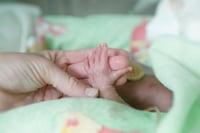Preterm Birth Linked to Childhood Depression

Preterm birth before 28 weeks of gestation may be linked to childhood depression, suggests a study in the Journal of the American Academy of Child & Adolescent Psychiatry.
Subina Upadhyaya, M.P.H., and colleagues at the University of Turku in Finland analyzed data from several large Finnish health care databases to identify 37,682 cases of childhood depression in people born between January 1987 and December 2007. These patients were diagnosed before December 2012, when they were at least 5 years old. The researchers then matched these patients with 148,795 control patients without childhood depression.
Compared with patients born at full term, the odds of developing childhood depression were 89% higher in those who were born at 25 weeks of gestation or less, 162% higher in those born at 26 weeks of gestation, and 93% higher in those born at 27 weeks of gestation.
“The potential mechanisms underlying depression in extremely preterm children and adolescents may be related to the causes of preterm birth, including genetic predispositions, pathologies during pregnancy, immature brain development in infants born extremely preterm, and psychosocial risks related to the postnatal hospital environment and later growth environment of preterm infants,” the researchers wrote.
For related information, see the American Journal of Psychiatry article “Prenatal Primary Prevention of Mental Illness by Micronutrient Supplements in Pregnancy.”
How Does Racism Impact Your Practice? APA Task Force Wants to Know
The APA Presidential Task Force on Structural Racism Throughout Psychiatry is fielding a new short survey on the impacts of racism on psychiatric practice. Help inform the task force’s important work and share your thoughts by Friday, October 23. Learn more about the task force and view the results of its previous two surveys on the task force webpage.





